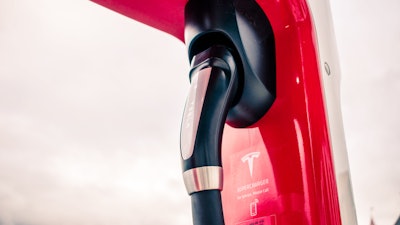
Electric vehicles (EVs) are becoming increasingly important in the global effort to reduce reliance on fossil fuels, driving massive growth in consumer demand. This demand has wide-reaching impacts, particularly on tourism.
In 2021, car rental company Hertz announced its plans to purchase 100,000 Tesla cars for rental. However, the charging station infrastructure needs to be able to handle this surge in demand from the tourism industry and alleviate customers’ anxiety about the driving range of EVs.
One solution is for hotels to install charging stations so holidaymakers can charge their vehicles during overnight stays, but is it in the hotels’ interest to offer the service?
A new study by researchers at Xi’an Jiaotong-Liverpool University and Fudan University is the first to analyse actual business data to quantify the impact and benefits of hosting charging stations at hotels.
Aligning target markets
The researchers looked at the impact of hosting Tesla charging stations on 2,774 hotels in Texas between 2015 and 2018. They used the monthly revenue of hotels in three categories based on hotel price and brand position: luxury (top 15%), upscale (next 15%), mid-price and cheaper (lower 70%).
The study finds that upscale hotels benefit the most from hosting Tesla charging stations, particularly after the introduction of the Tesla Model 3.
Dr Lixian Qian, the first author of the study, suggests that this result is due to Tesla and upscale hotels having similar target markets.
“We believe that our findings can be explained by brand alignment. Tesla’s original model, the luxury sedan model Model S, was aimed at a high-end niche market. When Tesla introduced the more affordable Model 3, the target market changed to the mainstream middle-class consumer.
“This matches the target market of upscale hotels, rather than those aimed at the luxury or budget markets. As a result, the benefits of hosting Tesla chargers increased for upscale hotels but decreased for luxury hotels.
“We argue that emotional association with the Tesla brand strengthened in consumers of upscale hotels after the introduction of Model 3, while weakened for consumers of luxury hotels.
“Using a brand-matching perspective, we can understand the difference in the impact of hosting charging stations on the various tiers of hotels. That’s why it’s so important for companies to align themselves with appropriate brand partners.”
Benefits of nearby attractions
The study also looked at how local tourist attractions influenced the impact of charging stations on hotel revenue.
Dr Qian says: “Our results show that hotels benefit most from hosting a Tesla charging station when there are many tourist attractions nearby. This suggests that tourists to these popular destinations are attracted to stay in hotels with charging stations and thus contribute to an increase in a hotel’s revenue.
“As the US administration is investing in expanding the nationwide charging infrastructure, our research suggests that travel and tourism industries should work together with policymakers to offer benefits.”
Dr Qian says that the methods used in this research will allow the evaluation of electric vehicle incentive policies in other markets worldwide, including in China. His future research will include investigating how different brands and types of chargers may benefit their hosts.
“Policies and consumer attitudes evolve over time, so it’s important to analyse their effectiveness and the ever-changing market.”






















